Whilst volunteering at Paola’s Ecohostel Medellin we had the opportunity to take part in some workshops and field trips. Sadly the visit to one of the local coal mines didn’t happen (although I know that Paola was glad – in here words she said – the Ecohostel doesn’t support the exploitation of Mother Earth – but we did do some really cool stuff which you can read about below.
Grass workshop
Lilian, Luz Maria and Luis Fernando live on top of a mountain in the house that their father built. Everything had to be carried up on the back of a mule and even now, when they go shopping they bring goods up on their shoulders. The nearest town is a precise 18 minutes away but as an indication of how steep the mountainside is, it takes 30 minutes to get back. Lilian, Luz Maria and Luis Fernando are all quite a bit over the age of 60 but you would never think so as they are so trim and sprightly and have a zest for life that is not slowed by their age.
They grow a specific type of grass which, after it is dried and coloured, the ladies sew into jewellery, purses and hats. Paola from the Ecohostel Medellin had arranged for us to visit this lovely family and after trekking for nearly three hours to their home we were treated to a tasty lunch and then we had a bash at making our own jewellery.
Once a month the trio travel to Medellin to sell their unique products at the awesome artisan market – but first they have to carry everything down from their mountain via the local town and setting off at stupid o’clock for the bus.
Clay Workshop
The clay arrived in a big tub and we were instructed to get down and dirty. The grey gloop had to be worked to the correct consistency and then silence descended over the Ecohostel Medellin as we concentrated. Clay flutes, an aeroplane, beads, salt and pepper pots destined for a display cabinet in the U.S. and even a backgammon board were produced. The finished products were then whisked away to a kiln to be dried out before being returned to us. My flute ended up in the bin as I dropped it while travelling but the backgammon board was very well used over the next few weeks despite the seed counters rolling away every so often.
Roof Tile Factory
Like a scene from a Dickens’ novel this small factory produced clay roof tiles. We had often seen the clouds of black smoke from the kilns drifting up through our valley and now we could understand the process. Machinery as old as the hills transformed splodges of clay into tiles which were then piled up into the kilns over the ovens by a team of soot covered men and twice a week fired up. The work is hard and filthy and we would see the men walking back down the lane after their shift with bodies black with coal dust and just the whites of their eyes shining bright. Our own little clay products from our workshop found their way here to be dried out along with the hundreds of roof tiles.
Bamboo construction
Paola wanted to construct a roof over the little barbeque area at the EcoHostel Medellin. The wood was harvested from the little jungly area and then the men turned up to build it. Holes were dug and poles sawn, a roof added and voila – it was completed in no time. The one thing that fascinated me about this process was that there is an optimum time to harvest bamboo. It shouldn’t simply be hacked down but the time of the month needs to be considered. If you ever doubt the effects of the moon on our planet try cutting bamboo at the wrong time. The gravity of the moon affects the water in the wooden stems – pulling it up and easing it down in a natural rhythm. Cut when the moon (and tides) are strong and you end up with a wooden pole full of water!
Soap Making
We made our own soap from used cooking oil. Like chemists we mixed and stirred our oil and the necessary acid NAOH sodium hydroxide to ‘cook’ the gloop. Care is needed here as te misture has a potential to explode! Essential oils can be added to make it smell sweet but we added lime juice and teatree oils as we wanted to use our soap for the dishes and laundry. With soap you have to be patient, waiting for a month or so for the chemical process to work but it is a great way to utilise that old cooking oil rather than simply dumping it. One of our volunteers had made soap in the States previously – and she showed us pictures of soap as pretty as cupcakes, whilst our product was more functionable
Visit to the Panela Factory
We set off in a jeep to a small village high in the mountains to the panela factory. Run as a local cooperative, farmers bring their sugar cane here twice weekly for it to be converted to panela which forms the basis for so many things here in Colombia.
Using very basic machinery the canes are stripped and pressed and the juices then boiled until caramelised. Worked by a team in large steel basins the sugary mess is then pummeled into submission and formed into round puddings to harden before being packed.
A bottle that was bobbing around in the hot tank caused much interest as the worker would periodically swoosh boiling panela over it. What part of the process could a bottle possibly contribute? Umm – the man was simply heating his coffee back up.
Afte buying some panela we were then invited to Raul’s home high on a ridge with THE most spectacular views and he played his guitar for us. Traditional Colombian tunes filled the air with such simply haunting sounds – I know that I shed a few tears as did some of the other volunteers as he softly played and sang for us with the mountains of Antioquia tumbling down behind him.
Machete, machete, machete
This was not really a workshop but is a useful lifeskill to have. Why don’t we have machetes in the UK? Well balanced, they slice through most things with complete ease. Hacking down thick bamboo poles, chopping through the undergrowth or digging up weeds – these tools are amazing and I want my own. I am sure that adding machete handling to my CV will make future employers stand up and beg for me to work for them.
Bocachi
This is a Japanese inspired way of making a quick soil from crap. Yep – we were off into the fields opposite the finca with our shovels and collecting cow shit. These cows are free range eating the finest grass but they produce the sloppiest poos. By the end of our sessions we were plastered in the stuff!. Leaves, yeast malt and other stuff go into the pile which is then mixed and covered with a tarp. It heats up – and I mean it REALLY heats up and is turned twice daily. Within about ten days there is sweet smelling compost ready to spread onto the newly constructed terraces and it can be planted up. The climate in this part of the world is perfect for cultivating things and within four weeks we had tomatoes ripening in the new beds.
Poker
I learnt to play poker. I loved this game. Buying a handful of beans, seeds and bamboo chips we gambled a couple of evenings away. Considering I had never played before I didn’t disgrace myself (although I didn’t win). We were serious but fun, sat in one of the tiny mountainside bars that litter Latin America drinking beer and eating lemon flavoured crisps.
Bars here are set up on any piece of ground, often contain a pool table or french billiards (like snooker or pool but you play with just three balls and no pockets!!!) and are decorated in the most ingenious of ways with very little expense. Children usually play around, dogs pant and sprawl and music pumps out at full volume around the clock.
The above should give you a taster of the things that I got up to in my five weeks with Paola and the gang. In fact, I loved Amagá and the area so much that after my initial five weeks were up I moved in with a local family for four weeks and then I drifted back to the hostel for another two weeks

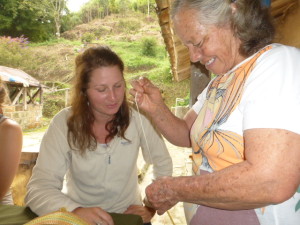
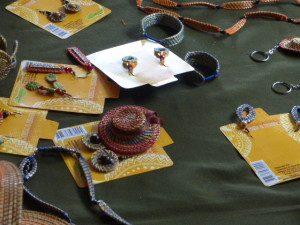
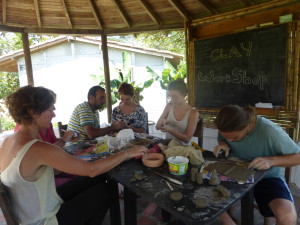
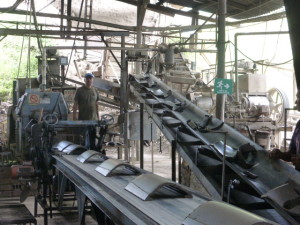
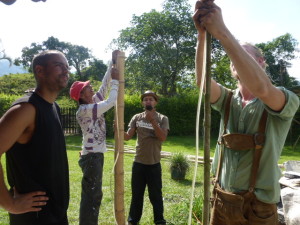
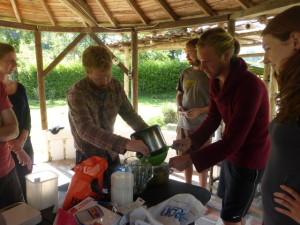
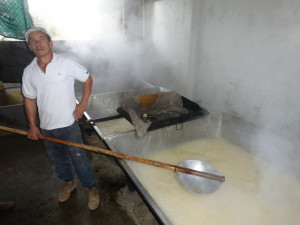
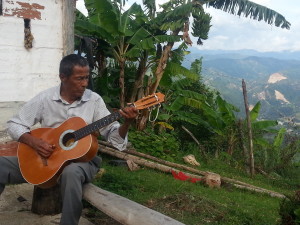
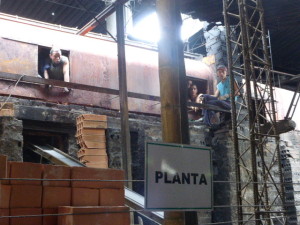
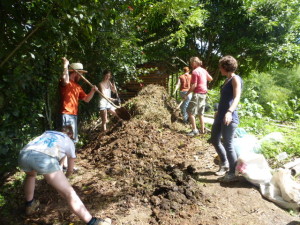
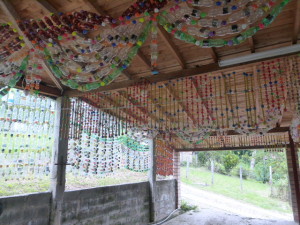
Hi honi,loved that write up it was so so interesting and always good to read you’re still enjoying the adventure. It reminded me of village life when I visited my dad’s mum, as a young girl, everything was basic and home made or grown. Convenience has its plusses but doesn’t beat home done stuff. If technology ever fails I will defo move to a commune with you – you can teach us all! XXXX
It was alll so interessting and with a great gtoup of volunters too